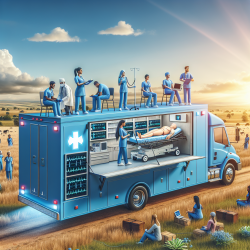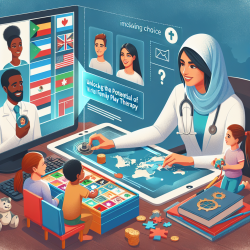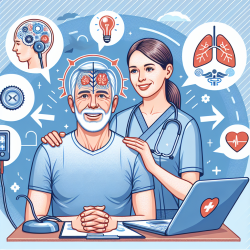Introduction
In the realm of healthcare, especially in rural settings, continuous professional development can be challenging. The research article "Mobile Medical Simulation for Rural Anesthesia Providers: A Feasibility Study" explores an innovative approach to address these challenges. This blog will delve into how mobile medical simulation can improve skills and outcomes for rural healthcare practitioners, particularly those in anesthesia.
The Challenge
Rural anesthesia providers, often family physicians with additional training, face unique challenges such as professional isolation and limited access to continuing education. These barriers can lead to skill degradation over time, impacting patient care quality. The study conducted in rural Saskatchewan aimed to bridge this gap by introducing mobile medical simulation as a feasible solution.
Key Findings
The study implemented a one-day interdisciplinary mobile simulation workshop for healthcare providers in a rural hospital. The results were promising:
- Participants reported improved knowledge and found the experience valuable.
- The workshop prompted reflection on clinical deficiencies and encouraged learning strategies to address these gaps.
- Despite logistical challenges, the workshop facilitated interprofessional training and improved communication between rural and urban healthcare providers.
Implementation Strategies
For practitioners looking to enhance their skills, adopting mobile medical simulation can be a game-changer. Here’s how you can implement this in your practice:
- Collaborate with Educational Institutions: Partner with universities or medical schools that have simulation resources.
- Utilize Existing Scenarios: Leverage pre-developed scenarios to reduce preparation time and focus on execution.
- Focus on Interprofessional Training: Encourage participation from various healthcare roles to enhance team-based skills.
- Seek Funding and Support: Explore funding opportunities from health associations or government bodies to cover costs.
Looking Forward
While the study highlighted the high costs and logistical challenges of mobile simulation, the benefits in terms of skill enhancement and professional development are undeniable. Future research should focus on cost-effective methods, such as telesimulation, to expand access to rural areas without the need for extensive travel or equipment transport.
For practitioners, staying informed and involved in such innovative educational approaches is crucial. Engaging in further research and advocating for mobile simulation can help sustain and improve healthcare delivery in rural settings.
Conclusion
Mobile medical simulation offers a promising avenue for enhancing the skills of rural anesthesia providers. By bridging the educational gap, it ensures that rural healthcare practitioners can deliver high-quality care, ultimately benefiting the communities they serve.
To read the original research paper, please follow this link: Mobile medical simulation for rural anesthesia providers: A feasibility study.










